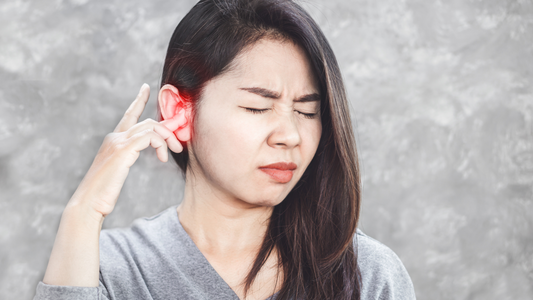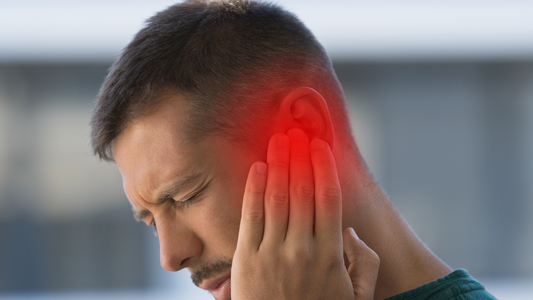Worried about a slip or a fall leading to a head injury? It's a common concern as we age. Those little accidents can also come with a persistent ring in the ears, a condition known as tinnitus. It's troublesome and not something we can just wish away. So, what's behind it, and how do we handle it?
Consider the last time you might have bumped your head, perhaps retrieving holiday decorations from storage. It might surprise you, but such a bump could be the reason behind the buzzing or ringing in your ears in quieter moments. Yes, a simple knock can have lasting effects on your hearing. It's irritating, but it's also a sign that there's a disconnect in how your brain and ears communicate post-impact. Interested in the details? Stick with me as we get into what's behind these unsolicited sounds and discuss ways to deal with the ringing.
Understanding the Causes of Head Injuries
Head injuries can happen in the simplest of situations. You're watching your grandkid play soccer, and out of the blue, a ball hits you. That's a head injury right there. Or perhaps you're fixing something on the roof, you lose your footing, and down you go. It's these straightforward accidents that can cause your brain to knock against your skull, similar to how an egg yolk can get tossed around inside its shell.
So, what are some common causes behind head injuries? One big risk is falling, which is not uncommon as we age and our balance isn't quite what it used to be. Sports, even gentle cycling in the park, can lead to injuries if you take a tumble. And driving can be a concern too; a minor car crash can knock your head around more than you might expect. Let's not ignore those everyday mishaps either, like stumbling over a child's toy or slipping on a slick surface.
Understanding the reasons for head injuries is about being proactive for ourselves. You don't have to go to extreme lengths to stay safe, but some awareness about potential risks can help you protect your most precious asset—your brain.
Symptoms of Head Injuries
Got a bump on the head and wondering if it's serious? Your body has its own way of hinting at trouble. Say you tripped on a root while out for a walk. At first, no big deal, but then you start feeling off. That's a signal to tune into what your body's trying to say.
If after a knock, you're nursing a headache, that's a clue. And it doesn’t stop there. Feeling dizzy when getting up, or flinching at bright lights and loud sounds? Can't remember where you left your keys, or keep mixing up dates? These are telltale signs from your body—don't shrug them off.
Physical and Cognitive Signs
Physical signs can be subtle, like suddenly needing a nap, or your eyesight going wonky. Cognition-wise, is thinking straight getting tougher? If decisions seem harder and your thoughts are foggy, that's your brain hinting it's not okay. Don't ignore these quiet warnings.
Emotional Changes
Emotional shifts are part of the mix too. Feeling quick to anger or swinging from one mood to the next could stem from that spill. Watch out, these symptoms can be sneaky, often showing up days later. So keep a lookout for mood changes.
Spotting symptoms early is like solving a puzzle—it can make a world of difference. You know your body best, so if it's raising an alarm, pay attention and get checked out. Better to be safe and catch things early, right?
Why does tinnitus occur with a head injury?
Ever notice a sort of ringing in your ears when all else is quiet? That could be tinnitus. It's like background noise that doesn't quite belong, sticking around longer than you'd want. Maybe you remember a time when you hit your head while reaching for something in the attic. It might not seem related, but that knock on the head might be why you're now sometimes hearing these unfamiliar sounds. A hit to the head can jar the intricate system inside your ear and brain - the parts that handle hearing. Much like a storm can skew your TV reception, a head injury can disturb your hearing, which can sometimes translate into this unwanted noise.
Understanding the Connection
Hearing these phantom sounds isn't some mysterious phenomenon; it has a solid explanation. Your brain and ears work in concert to interpret sound. But if they suffer harm, their communication can get disrupted. Imagine a piano with tangled keys, hitting the incorrect notes. Just like that, a head injury can result in the auditory areas of your ear or brain getting their signals confused, leading to that pesky tinnitus.
Management of Tinnitus from Head Injuries

If you've experienced a head injury, you might be familiar with the lingering ringing in your ears known as tinnitus. It's a condition that may persist after a bump to the skull, and managing it effectively can make all the difference in your comfort and quality of life.
Time to Visit a Hearing Specialist
Think of your hearing system like a finely tuned instrument. When there's a glitch, seeing a hearing specialist might just be your best bet. They've got the expertise to diagnose the issue with a variety of tests and could offer solutions to mitigate that buzzing sound. They might even recommend hearing aids or sound therapy, providing you relief from the relentless ringing.
Exploring Masking Techniques
Ever used background noise to overpower an unwanted sound? That's essentially what masking is. Some people opt for specialized devices that emit calming sounds to counteract the tinnitus. Others might simply use a fan or play music. These masking sounds can sometimes distract your mind enough to give you some respite from tinnitus.
Additional Coping Strategies
Lowering stress is another strategy that can help ease tinnitus. High stress can amplify the ring, so finding ways to relax could potentially diminish its intensity. Consider options like acupuncture, practicing mindfulness, or engaging in regular exercise. While they may not stop tinnitus, these activities can support your overall well-being and possibly reduce the impact of tinnitus on your daily life.
Ways to Protect Yourself from Further Damage
Just like you wouldn't walk on thin ice twice, protect your head after an injury. A simple helmet can save you a lot of trouble whether you're biking or rollerblading—better safe than sorry.
Safeguarding Your Ears
Loud noises aren't just a nuisance, they can harm your ears. Ever walk out of a concert with ringing ears? That's your cue to consider earplugs for the next loud event. It's a small but smart step to guard your hearing.
Minding Your Surroundings
It's often the small things that trip you up—a rug, a step, or a pet toy. Pay attention to your path and keep your home tidy. A clear floor means fewer obstacles to trip over.
Being cautious doesn't mean you stop enjoying life. It's about making wise choices to maintain your head and ear health. After all, you're at your best when you feel great.
Wrapping Up: Keep Your Ears Happy and Healthy!
You know that feeling when something simple goes sideways, like reaching for the top shelf and suddenly you're dealing with a whole mess more than you bargained for? That's pretty much what can happen with your hearing after a head knock. A jolt like that might mess with the inner workings of your ears and brain, leaving you with a nagging ring that doesn't seem to quit. But it's not the end of the world.
Even if these new sounds are leaving you scratching your head, there are definitely ways to tackle them. Simple steps and handy techniques, whether it's white noise or unwinding with your favorite hobby, can work wonders. And if things are getting on your nerves, there's tech out there like the HearWell Group's latest gear that might just do the trick. Picking the right one is like finding that comfy sofa spot - it just feels right. Just pay attention to what goes on upstairs, take good care of your ears, and you'll be on track for keeping those buzzes at bay.
Sources & References
- Kreuzer, P. M., Landgrebe, M., Schecklmann, M., Staudinger, S., & Langguth, B. (2012). Trauma-associated tinnitus: audiological, demographic and clinical characteristics. PloS one, 7(9), e45599. https://www.ncbi.nlm.nih.gov/pmc/articles/PMC3458888/
- Hoffer, M. E., Balaban, C., Gottshall, K., Balough, B. J., Maddox, M. R., & Penta, J. R. (2010). Blast exposure: vestibular consequences and associated characteristics. Otology & Neurotology, 31(2), 232-236. https://pubmed.ncbi.nlm.nih.gov/20009782/
- Jury, M. A., & Flynn, M. C. (2001). Auditory and vestibular sequelae to traumatic brain injury: a pilot study. The New Zealand Medical Journal, 114(1134), 286-288. https://pubmed.ncbi.nlm.nih.gov/11480509/
- Munjal, S. K., Panda, N. K., & Pathak, A. (2010). Relationship between severity of traumatic brain injury (TBI) and extent of auditory dysfunction. Brain Injury, 24(3), 525-532. https://pubmed.ncbi.nlm.nih.gov/20184407/
- Langguth, B., Kreuzer, P. M., Kleinjung, T., & De Ridder, D. (2013). Tinnitus: causes and clinical management. The Lancet Neurology, 12(9), 920-930. https://www.thelancet.com/journals/laneur/article/PIIS1474-4422(13)70160-1/fulltext
- Folmer, R. L., & Griest, S. E. (2003). Chronic tinnitus resulting from head or neck injuries. The Laryngoscope, 113(5), 821-827. https://pubmed.ncbi.nlm.nih.gov/12792317/

The Hear Well Group Research Team: Trusted Hearing Health Insights
Our experienced research team compiles hearing health data from credible, peer-reviewed sources and presents it in easy-to-understand terminology. We ensure accuracy and trustworthiness, providing up-to-date, evidence-based recommendations to enhance hearing care practices and inform our readers' hearing well-being decisions.


